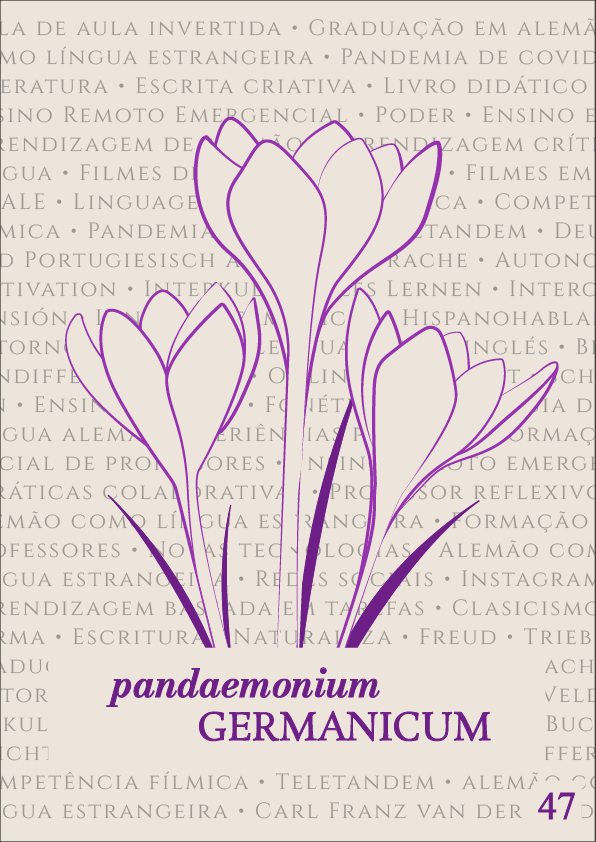Flipped classroom in Higher Education: an experience in German language classes
DOI:
https://doi.org/10.11606/1982-8837254713Keywords:
Remote learning, Flipped classroom, German as foreign language in undergraduate coursesAbstract
During the Covid-19 pandemic it was necessary to adopt new measures in higher education in order to maintain social distance. Thus, remote teaching, based on studies on hybrid teaching, became an option in a graduate German language discipline. Research on flipped classrooms online (Lee, Wallace 2018; Leffa, Duarte, Alda 2016; Reidsema, Kavanagh, Hadgraft 2017; Rozenfeld, Schäfer 2021; Valente 2014), more specifically, helped us structure a model, in which the first asynchronous contact with the content preceded synchronous practical classes. This article aims to address the organization of the discipline by the teacher and its reception by learners. Thus, a qualitative action-research was carried out, in which data was collected from documents produced by the teacher (discipline calendar and worksheets), as well as activities and questionnaires answered by the students. Through data analysis, we consider that the new format focuses on the practical use of the language through collaborative writing, role-plays, project development, among other activities, and was well received by students. However, there are still future directions for research, in order to analyse the planning of classes and assessments.
Downloads
References
BAUER, Martin W.; GASKELL, George; ALLUM, Nick. Qualidade, quantidade e interesses do conhecimentos: Evitando confusões. In: BAUER, Martin W. GASKELL, G. (Org.) Pesquisa qualitativa com texto, imagem e som: Um manual prático. 7ª Ed. Petrópolis: Editora Vozes, 2008.
BELL, Theresa R. The flipped German classroom. In: Moeller, Aleidine J. Learn Languages, Explore Cultures, Transform Lives. 2015 Report of the Central States Conference on the Teaching of Foreign Languages, 2015, 17-38. Disponível em: <https://files.eric.ed.gov/fulltext/ED598272.pdf#page=33> (17/09/2019).
DEWEY, JOHN, Experience and education. Nova York: Kappa Delta, 1938.
FLIPPED CLASSROOM FIELD GUIDE. Weber.edu. Disponível em: <https://weber.edu/WSUImages/tlf/TLF%202013/Flipped%20Classroom%20Field%20Guide.pdf> (12/07/2021).
FREIRE, P. Pedagogia do Oprimido. 17. ed. Rio de Janeiro: Paz e Terra, 1987.
FUNK, Hermann, et. al. . Studio 21, Berlin: Cornelsen, 2015.
GREENAWAY, ROGER. Powerful Learning experiences in management learning and development. Tese de PHD, Lancaster University, Reino Unido, 1995.
KOLB, DAVID A. Experiential learning: experience as the source of learning and development, New Jersey: Prentice-Hall, 1984.
LEE, Given; WALLACE, Amanda. Flipped Learning in the English as a Foreign Language Classroom: Outcomes and Perceptions. Tesol Quarterly, v. 52, n. 1, 62-84, 2018.
LEFFA, Vilson José; DUARTE, Gabriela Bohlmann; ALDA, Lucia Silveira. A sala de aula invertida: o que é e como se faz. In: JORDÃO, C. M. (Org.) A linguística aplicada no Brasil: rumos e passagens. 1. Ed. Campinas: Pontes Editores, , v. 1, 2016, 365-386.
LINDEINER-STRÁSKÝ, Karina von; STICKLER, Ursula; WINCHESTER, Susanne. Flipping the flipped: The concept of flipped learning in an online teaching environment. Open Learning: The Journal of Open, Distance and e-Learning, 1-17, 2020.
MONTEIRO, Edenar Souza; NANTES, Eliza Adriana Sheuer. O letramento digital como estratégia de ensino-aprendizagem no ensino superior, durante o ensino remoto emergencial. Research, Society and Development, v. 10, n. 10, 1-16, 2021.
REIDSEMA, Carl; HADGRAFT, Roger; KAVANAGH, Lydia. Introduction to the flipped classroom. In: REIDSEMA, Carl. et al. (Org.) The Flipped Classroom: Practice and Practices in Higher Education. Singapura: Springer, 2017.
RIBEIRO, Ana Elisa. Que futuros redesenhamos? Uma releitura do manifesto da Pedagogia dos Multiletramentos e seus ecos no Brasil para o século XXI. Diálogo das Letras, v. 9, 1-19, 2020.
ROJO, ROXANE. Entre Plataformas, ODAs e Protótipos: Novos multiletramentos em tempos de WEB2. ESPecialist, v.38, n.1, p.1-20.
ROZENFELD, Cibele Cecílio de Faria. A sala de aula invertida online no ensino remoto de alemão: quando os fins justificam os meios. In: ARANTES, Poliana Coeli Costa; UPHOFF, Dörthe (Org.). Ensinar alemão em tempos de (pós-)pandemia: impactos e construção de novos saberes. Campinas: Mercado de Letras, 2021 (no prelo).
STREET, Brian. What’s “new” in New Literacy Studies? Critical approaches to literacy in theory and practice. Current issues in comparative education, v. 5, n. 2, 77-91, 2003.
TAGATA, William Mineo; RIBAS, Fernanda Costa. Rethinking Digital Literacy Practices and Educational Agendas in Times of Covid-19 Uncertainty. Revista Brasileira de Linguística Aplicada, v. 21, 399-431, 2021.
THIOLLENT, Michel. Metodologia da Pesquisa-ação. São Paulo: Cortez, 1947.
VALENTE, José Armando. Blended learning e as mudanças no ensino superior: a proposta da sala de aula invertida. Educar em revista, n. 4, 79-97, 2014.
Downloads
Published
Issue
Section
License
Copyright (c) 2022 Pandaemonium Germanicum

This work is licensed under a Creative Commons Attribution-NonCommercial-NoDerivatives 4.0 International License.



